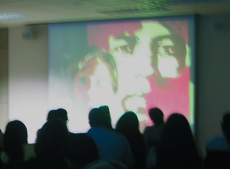A screening of the documentary, “Invisible Children,” was held on campus March 13 and 14, along with the attendance of guest speakers.
This film presents, in a hip and young way, the suffering and brainwashing of children throughout Northern Uganda for the past 20 years. This information went unknown throughout America until a small group of filmmakers (Jason Russell, Bobby Bailey, and Laren Poole) from California created this documentary.
At a young age, the majority of children throughout Northern Uganda are abducted into joining the Lord’s Resistance Army, led by Joseph Kony. According to representatives from Invisible Children, over 20,000 children have been abducted over time and thrown in his militia as child soldiers.
The screening of “Invisible Children” was open to students March 13 and 14, from 2 p.m. to 3:20 p.m. on the fourth floor of the LRC, room 435.
A team from Invisible Children attended in addition to the screening. Recently featured in the San Diego Union Sun and on the “Oprah Winfrey” show, they were available to answer questions or concerns regarding the film.
“Our focus is to empower the generation, especially (people who were born at the turn of the century), so they know that they have a way to end apathy,” said Carli Clements, Invisible Children roadie.
In relation to “Invisible Children,” others around the San Diego area are doing their part to try to make a difference.
Stepping outside the box and broadening students mindsets, Mesa English professor Nancee Kesinger recently assigned her students an interesting research project.
Titled, “Children in Crisis,” Kesinger’s students were to choose one country out of a hat and compile a research paper discussing global issues and raise awareness among the American public.
Along with the research, students were to write a one-page claim, which Kesinger says, “Must include a specific action plan — a blueprint for detailed action, so to speak.”
Kesinger plans to send out this one-page written letter containing the students’ concerns and possible ideas for relief to their selected countries. These letters will be sent to a leader abroad or in the U.S., depending on the country chosen.
“I’ve always been an advocate of the awareness of third world countries and their needs,” said Kesinger’s English 205 student Shannon O’Donnell. “America tends to direct attention to Brittney’s [Spears] new hair cut, not situations that really matter. Some people in my class never heard about their chosen countries.”
In addition to the project, students were expected to attend the screening of “Invisible Children” on campus.
Lindsey Peterson, a member of the ReNuh project in Gulu, Uganda, which is associated with the Invisible Children project, recently returned from a trip helping restore and rebuild hospitals throughout Northern Uganda.
“This was a life changing experience,” Peterson said. “I can’t explain in so few words how much this opened my eyes. Realizing the conveniences in our lives, and then seeing children throughout Gulu without shoes or much clothing, really puts things in perspective.”
Children throughout the world deal with various crises, many of which go unknown or un-discussed by the public. Kesinger, Peterson, and the filmmakers of Invisible Children are a few people involved in projects regarding these issues.
This film has raised concern among American citizens and the movement has brought some form of resolution and plan to eventually and completely end the child militia in Northern Uganda.
Between ReNuh and Invisible Children, there are on-going relief efforts open to the public. For more information on these causes, visit www.InvisibleChildren.com and/or www.ReNuhProject.com.

